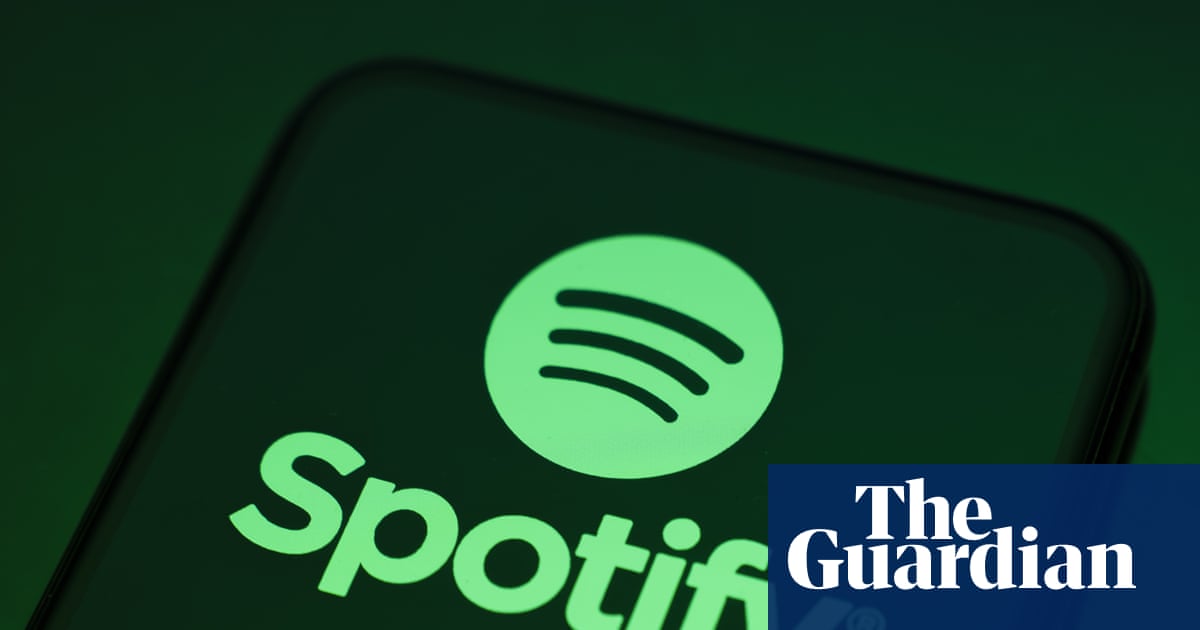This month, indie musicians in Oakland, California, gathered for a collection of talks known as Demise to Spotify, the place attenders explored “what it means to decentralize music discovery, manufacturing and listening from capitalist economies”.
The occasions, held at Bathers library, featured audio system from indie station KEXP, labels Cherub Dream Information and Dandy Boy Information, and DJ collectives No Bias and Amor Digital. What started as a small run of talks rapidly bought out and drew worldwide curiosity. Individuals as distant as Barcelona and Bengaluru emailed the organizers asking find out how to host related occasions.
The talks come as the worldwide motion towards Spotify edges into the mainstream. In January, music journalist Liz Pelly launched Temper Machine, a vital historical past arguing the streaming firm has ruined the business and turned listeners into “passive, uninspired shoppers”. Spotify’s mannequin, she writes, relies on paying artists a pittance – much less nonetheless if they comply with be “playlisted” on its Discovery mode, which rewards the sort of bland, coffee-shop muzak that fades neatly into the background.
Artists have lengthy complained about paltry payouts, however this summer season the criticism grew to become private, concentrating on Spotify’s billionaire co-founder Daniel Ek for his funding in Helsing, a German agency growing AI for army tech. Teams together with Large Assault, King Gizzard & the Lizard Wizard, Deerhoof and Hotline TNT pulled their music from the service in protest. (Spotify has harassed that “Spotify and Helsing are two separate firms”.)
In Oakland, California, Stephanie Dukich learn Temper Machine, heard in regards to the boycotts, and was impressed.
Dukich, who investigates complaints towards the town’s police, was a part of a studying group about digital media at Bathers library. Although she shouldn’t be a musician, Dukich describes herself, alongside together with her pal and artwork gallery employee Manasa Karthikeyan, as “actually into sound”.
She and Karthikeyan determined to begin related conversations. “Spotify is enmeshed in how we have interaction with music,” Dukich says. “We thought it might be nice to speak about our relationship to streaming – what it means to truly take our information off and discover ways to try this collectively.” Demise to Spotify was born.
The objective, briefly, was “down with algorithmic listening, down with royalty theft, down with AI-generated music”.
Karthikeyan says the duty of quitting Spotify lies as a lot with listeners as artists. “It’s important to settle for that you just gained’t have immediate entry to every little thing,” she says. “That makes you suppose more durable about what you help.”
However will both musicians or listeners even have the nerve to truly boycott the app longterm?
A number of well-known musicians have pulled their catalogues from Spotify with huge, headline-grabbing bulletins over time, solely to quietly come crawling again to the platform after a while. One of many app’s hottest artists, Taylor Swift, boycotted the service for 3 years in protest of its unfair fee practices however returned in 2017. Radiohead’s frontman. Thom Yorke, eliminated some his solo tasks for a similar cause in 2013, calling Spotify “the final determined fart of a dying corpse”; he later put them again.
Neil Younger and Joni Mitchell left the app in 2022, citing the corporate’s unique cope with anti-vax podcast host Joe Rogan; each Canadian singer-songwriters contracted polio as kids within the Fifties. They, too, later restored their catalogues on Spotify.
Eric Drott, a professor of music on the College of Texas at Austin, says the brand new wave of boycotts feels completely different. “These acts are much less well-known. For years, artists knew streaming wouldn’t make them wealthy however wanted the visibility. Now there’s a lot music on the market, individuals are questioning whether or not it’s doing a lot for them.”
Will Anderson, frontman of Hotline TNT, says there’s “a 0% probability” his band will return. “It doesn’t make sense for true music lovers to be on there,” he says. “Spotify’s finish recreation is for you not to consider what’s enjoying.” When the band bought their new report Raspberry Moon straight via Bandcamp and a 24-hour Twitch stream, they bought a whole lot of copies and “generated 1000’s of {dollars}”.
Others resembling pop-rock songwriter Caroline Rose are experimenting too. Her album Yr of the Slug got here out solely on vinyl and Bandcamp, impressed by Cindy Lee’s Diamond Jubilee, which was initially accessible solely on YouTube and the filesharing web site Mega. “I discover it fairly lame that we put our coronary heart and soul into one thing after which simply put it on-line free of charge,” Rose says.
Rose is a member of the Union of Musicians and Allied Staff (UMAW), an advocacy group shaped initially of the Covid-19 pandemic to guard music staff. Joey DeFrancesco, a member of the punk rock band Downtown Boys and co-founder of UMAW, says the group “unequivocally helps artists taking company, holding firms accountable, and making splashes [such as taking music off Spotify] to push again on the firm”. On the similar time, DeFrancesco says, that sort of individualized boycotting has its “limits”.
“What we attempt to do within the labor motion and at UMAW is to behave collectively,” he provides. Examples embody UMAW’s profitable marketing campaign (alongside the Austin for Palestine Coalition) to strain the music competition South by Southwest to drop the US military and weapons producers as sponsors for the 2025 occasion, and the Residing Wages for Musicians Act, sponsored by consultant Rashida Tlaib, a invoice that might regulate Spotify payouts to artists.
The Demise to Spotify organizers say their objective shouldn’t be essentially to close the app down. “We simply need everybody to suppose slightly bit more durable in regards to the methods they take heed to music,” Karthikeyan says. “It simply flattens tradition at its core if we solely persist with this algorithmically constructed consolation zone.”

